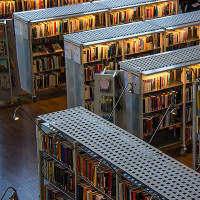 (A) 25th October 1730-1900
(A) 25th October 1730-1900
Public Lecture: Public Art and Copyright Law (An Exploratory Analysis) by Lilla Montagnani (see below)
(B) 8th November 1730-1900
Public Lecture: Copyright Reversion to Authors (and the Rosetta Effect): Ameliorating the Problem of Disappearing Books by Paul Heald (see below)
(C1) 10th November 1100-1230 & 1230-1300
Meeting: Copyright Evidence Wiki Board Meeting (Closed meeting followed by Public Q&A – see below)
(C2) 10th November 1400-1615
Workshop: Copyright Education and Educating Users / Legal and business model constraints on the transformative value of heritage collections (see below)
(D) 15th November 1730-1900
Public Lecture: Taking seriously the author’s interest in copyright by Rebecca Giblin (see below)
(E) 8th December 1100-1830
CREATe / BFI Education Screening Event: Copyright & Creative Reuse (see below)
See individual event links for further details. Join the conversation on Twitter: Tweet #createcin

Wangjing Soho (Photo: Eric Zhang CLSD, CC BY-NC 2.0)
(A) CREATe Public Lecture: Public Art and Copyright Law (An Exploratory Analysis)
Venue: Humanities Lecture Theatre, Main Building, University of Glasgow
Date: 25 October 2017
Time: 1730-1900
Speaker: Lilla Montagnani (Universita’ Bocconi, Milan) @MontagnaniLilla
Chair: Thomas Margoni (CREATe, University of Glasgow)
The creation of tangible copies from a work of art that is publicly displayed has always been a rare practice, until some recent cases attracted huge media attention. Zaha Hadid’s Wangjing Soho being pirated in Chongqing and the Chinese copy of the UNESCO-protected Austrian town of Halstatt have officially marked the entrance into the age of repeatability for architecture. “Public art” as copyright subject matter is indeed of particular interest. The analysis of the underpinning of private and public interests suggests that, as public art is born to be displayed in public spaces and to “exist” in a single copy, the author–owner–society relationship becomes exceptionally puzzling. It is this last relationship that modifies how architectural works are protected under copyright law and how, therein, the balance between private and public interest is struck.
See a report of the lecture here

(Photo: ami photography, CC BY-NC 2.0)
(B) CREATe Public Lecture: Copyright Reversion to Authors (and the Rosetta Effect): Ameliorating the Problem of Disappearing Books
Venue: Humanities Lecture Theatre, Main Building, University of Glasgow
Date: 8 November 2017
Time: 1730-1900
Speaker: Paul Heald (University of Illinois) @pauljheald
Chair: Andreas Rahmatian (University of Glasgow)
Copyright keeps out-of-print books unavailable to the public, and commentators speculate that statutes transferring rights back to authors provide incentives for the republication of books from unexploited back catalogs. This study compares the availability of books whose copyrights have been subject to statutory reversion under US law with books whose copyrights are still controlled by the original publisher. It finds that 17 USC § 203, which permits reversion to authors in year 35 after publication, significantly increases in-print status. The 2002 decision in Random House v. Rosetta Books, which worked a sudden de facto reversion of ebook rights to authors, also has a positive effect on in-print status. Conversely, the rule of 17 USC § 304, which permits reversion 56 years after publication, does not correlate with any significant increase in availability. The data suggest a positive public benefit would attach to properly crafted reversion rights to authors. Reversion rights, unlike proposals to shorten the term of copyright, are permissible under the Berne Convention, and are politically palatable to legislatures.
See a report of the lecture here.

(C1) CREATe Wiki Board
Venue: CREATe Hub Room 404, 10 The Square, University of Glasgow
Date: 10 November 2017
Time: Closed meeting 1100-1230, Public Q&A 1230-1300
Participants to include Kris Erickson, Heather Ford, Rebecca Giblin, Paul Heald, Martin Kretschmer, Thomas Margoni, Fred Saunderson, Ruth Towse, Amy Thomas
The first meeting of the Copyright Evidence Wiki Editorial Board followed a ‘town hall’ format, enabling deliberation about the aims, objectives and content of the Wiki. Agenda items for discussion included: terms of reference for the Board, solicitation of new contributions to the wiki, mechanisms for ensuring transparency and independence of processes, and strategies to raise policymaking awareness of the Wiki and its contents.
The Copyright Evidence Wiki was initiated in 2015 by CREATe at the University of Glasgow and uses the open source MediaWiki platform. The purpose of the Wiki is to categorise existing empirical studies on copyright to inform public debate and policy based on objective evidence. The evidence base, currently consisting of 583 studies, is catalogued by country, industry and research method, offering the ability to compare approaches. The platform supports an open API which permits text and data mining of its contents, as well as network visualisation of linkages between studies.
See a review of the event here.

(C2) Workshop: Copyright Education and Educating Users / Legal and business model constraints on the transformative value of heritage collections
Venue: Kelvin Hall Lecture Theatre, 1445 Argyle St, Glasgow
Date: 10 November 2017
Time: 1400-1615
Keynote: Lorna Hughes
Speakers & Panelists: Martin Kretschmer (Chair), Lorna Hughes, Johanna Green, Bartolomeo Meletti, Fred Saunderson (NLS), Kerry Patterson and Victoria Stobo (CREATe University of Glasgow)
How can the collections of libraries, archives, and museums be unlocked to create value across the creative industries, and inspire new innovations in digital research and development? How can the primary sources of our heritage be made accessible and usable and re-usable for creativity and enjoyment by the broadest demographics?
Memory institutions play a major role in the creative economy, however, digital innovation in these organisations is frequently driven by access, rather than innovation, use, and re-use. Partnerships between memory organisations and HEIs are frequently driven by specific research questions and configured as rather limited ‘digital humanities’ activities, representing analogue knowledge as digital surrogates, rather than broader consideration of the role of information in shaping knowledge and creativity more broadly. We need to address these issues, establishing a creative exchange between the sectors that draws on digital innovation and re-imagines our engagement with heritage as a creative process that unlocks its value for all communities.
In this workshop we considered some of the problematic issues that underpin many of these general exceptions to copyright. For example: What constitutes ‘non-commercial’ use? How does the new exception for quotation differ from the long-standing exception for criticism and review? When has a work been ‘made available’ to the public? When is it reasonable to assume that an author has died more than 70 years ago or more? Which exceptions will always be available to users, regardless of the terms and conditions of any contract?
In addition, the workshop provided an opportunity to become familiar with two innovative digital resources – Copyright User and the Copyright Cortex – that can help cultural heritage practitioners better understand copyright, as well as helping you to help others understand how and when copyright enables creative use without the need for clearing rights.
For booking details, event information and speakers bios: see here
See a review of the event here.

(Photo: Susanne Nilsson, CC BY-NC 2.0)
(D) CREATe Public Lecture: Taking seriously the author’s interest in copyright
Venue: Humanities Lecture Theatre, Main Building, University of Glasgow
Date: 15 November 2017
Time: 1730-1900
Speaker: Rebecca Giblin (Monash University, Melbourne) @rgibli
Chair: Martin Kretschmer (CREATe, University of Glasgow)
Copyright is fundamentally a system of incentives and rewards. It is intended to incentivise initial production and continued investment in works in order to achieve the broader benefits that result from widespread dissemination of knowledge and culture. Beyond that, it is meant to reward authors for their contributions of personality and labour. But current approaches do a poor job of achieving either of these aims. Copyright’s incentive component is supposed to promote works’ continued availability, but rights are awarded in full, upfront, regardless of whether those investments are actually made – and very often they are not. The rewards component arises from creators’ moral claims, but the nature of creative labour markets means it very often ends up in the pockets of investors instead. Thus the ‘lump sum’ approach leads to enormous loss of cultural value – while still failing to get authors paid.
In this public lecture, Giblin explored how taking authors’ interests in copyright seriously could provide the key not only to (finally) improving their remuneration outcomes, but simultaneously free up neglected rights for fresh exploitation, support the emergence of new distribution models and reduce oligopoly power. She introduced a planned program of empirical research aimed at better understanding just what is lost under current approaches – and what we have to gain by navigating the gaps and flexibilities in the international treaty framework to come up with a system that will better achieve its aims.
See a report of the lecture here.

(E) CREATe / BFI Education Screening Event on Copyright & Creative Reuse
Venue: London, BFI Southbank, NFT3, Belvedere Rd, South Bank, London SE1 8XT
Date: 8 December 2017
Time: 1100-1830
Speakers: Bartolomeo Meletti, Claudy Op den Kamp, Annabelle Shaw, Frank Gray, Jenny Hammerton, Leontien Bout, Ronan Deazley, Mark Robinson, Charlie Lyne, Ben Green, Shane O’Sullivan, Lionel Bently
The event explored the role of copyright in relation to creativity, film archives, and education, with focus on creative reuse. The common theme to tie these topics together will be the creative reuse of the character of Sherlock Holmes. The evolving journey of the notorious detective from Sir Arthur Conan Doyle’s stories illustrated by Sidney Paget to its most recent adaptations – passing through William Gillette, Basil Rathbone and others – provides a compelling story to explore the role of copyright in relation to creativity, archives, and education.
The event brought together copyright law experts, film archivists and custodians, filmmakers and other creators. It provided the platform for a constructive dialogue between the people who preserve and provide access to existing films, and those who wish to reuse films in the creation of new work.
For booking details, event information and speakers bios: see here
| PR for above events: @copyrightcentre | Tweet #createcin |
